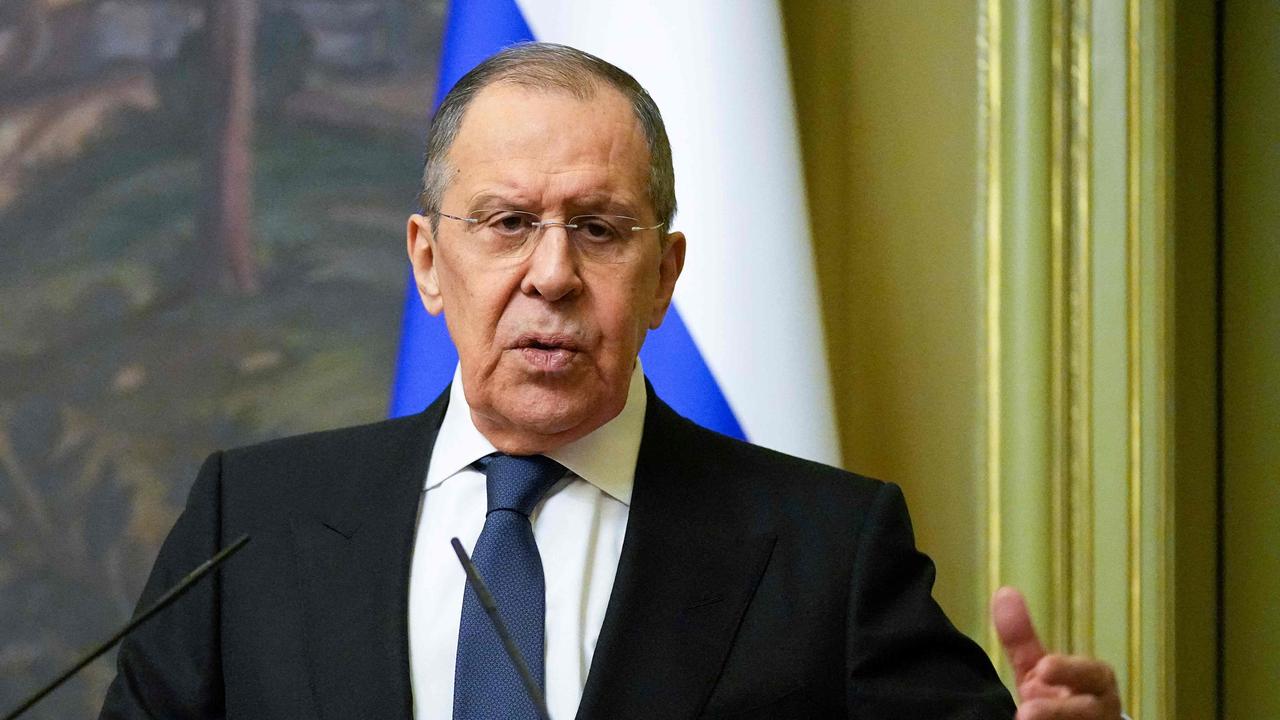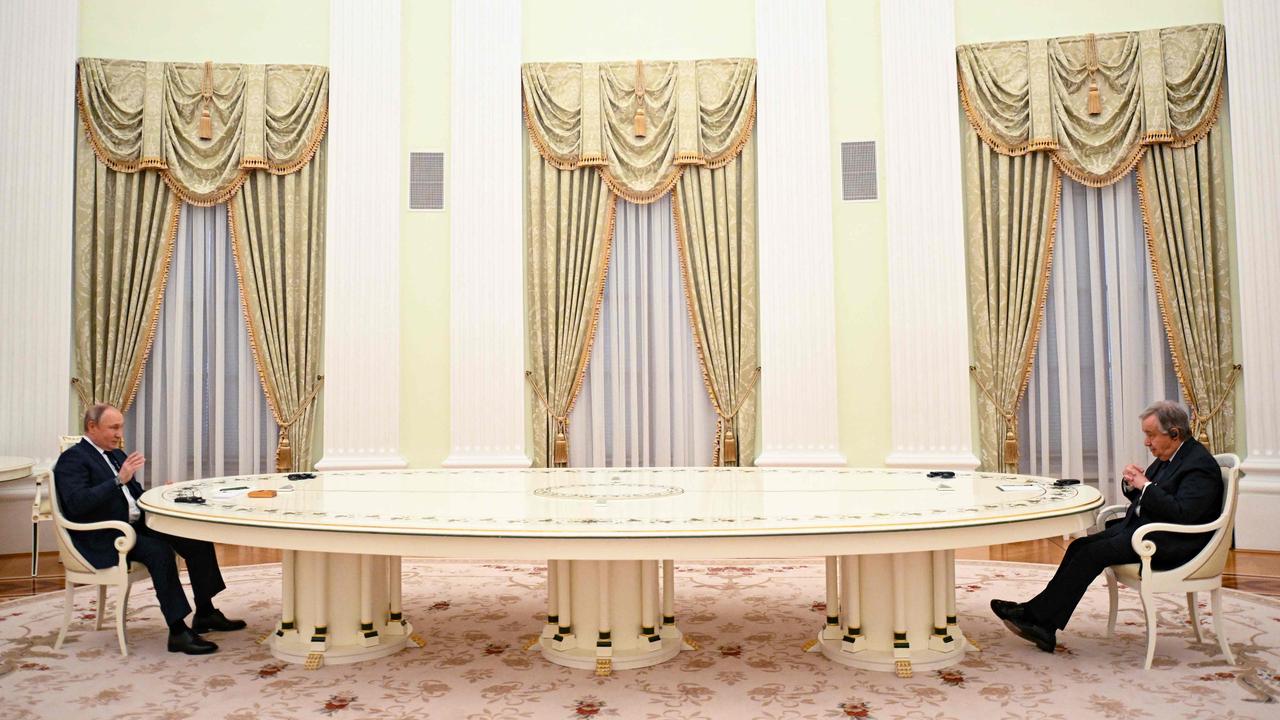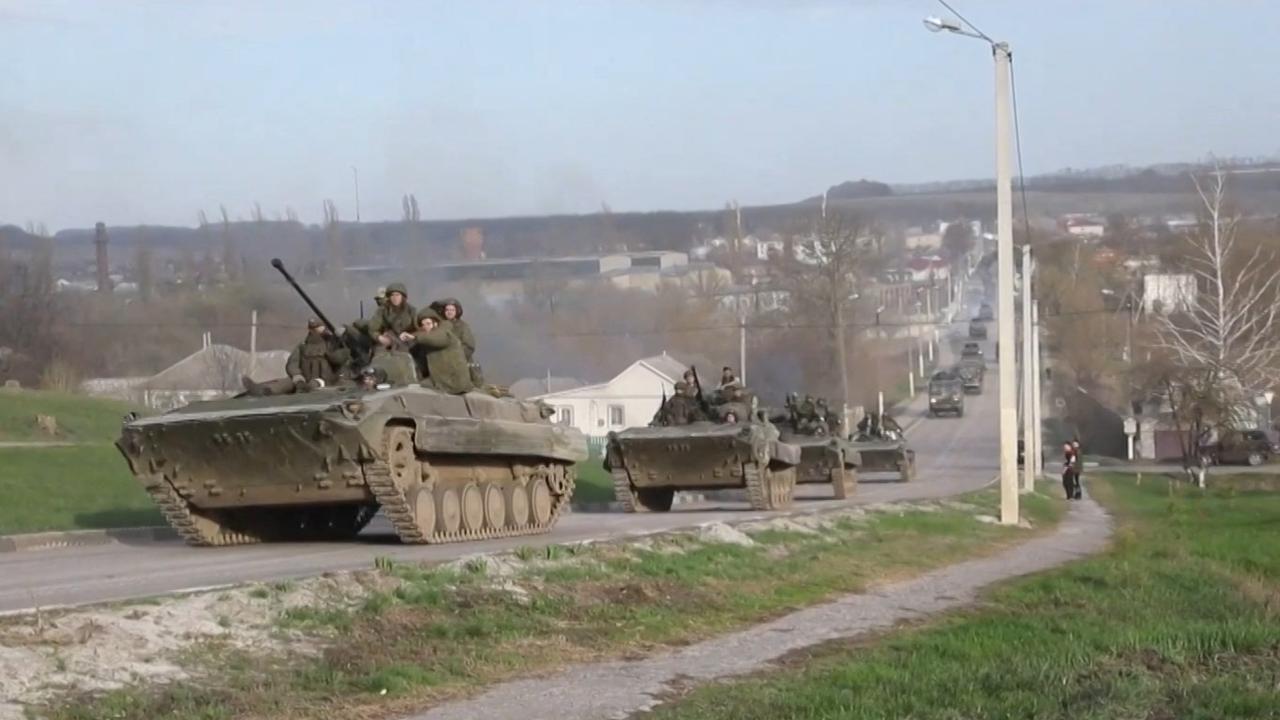
This article is more than
3 year oldRussia has warned of the “real” threat of World War III breaking out, ahead of a Tuesday meeting between the United States and allies over sending further arms to war-torn Ukraine.
In a chilling message, Sergei Lavrov accused the West of fighting a proxy war against Moscow due to its overt support for Kyiv by providing weapons.
He said the risk of an international dispute is now “considerable” – saying the West is essentially fighting a proxy war against Moscow via its support for Kyiv.
Speaking to Russian news agencies, Moscow’s Foreign Minister Sergei Lavrov warned the risk of a World War III “is serious” and accused NATO countries of “pouring oil on the fire” by “pumping weapons into Ukraine”.
“It is real, you can’t underestimate it,” Lavrov said.
“I would not want to elevate those risks artificially. Many would like that. The danger is serious, real, And we must not underestimate it.”
Moscow’s ambassador to the US has also ordered Washington to stop shipments to Ukraine.
Lavrov said: “NATO, in essence, is engaged in a war with Russia through a proxy and is arming that proxy. War means war.”
However, despite the stark warning, Russian President Vladimir Putin has told the head of the United Nations he “still has hope” that negotiations will end the conflict, a comment that was echoed by Lavrov.
Stream the latest news on the war in Ukraine live & on demand on Flash. 25+ news channels in 1 place. New to Flash? Try 1 month free. Offer ends 31 October, 2022 >

In response to the threatening claims, the UK appears to believe Moscow continues to be all bark and no bite.
Speaking to the BBC, Armed Services Minister James Heappey said there wasn’t “an imminent threat of escalation”.
“Lavrov’s trademark over the course of 15 years or so that he has been the Russian foreign secretary has been that sort of bravado,” he said.
Ukraine’s Foreign Minister Dmytro Kuleba also called it a ploy that showed Russia’s “last hope to scare the world off supporting Ukraine”.
UN visits Moscow
The remarks come as the Secretary-General of the United Nations António Guterres visited Russia on Tuesday, Moscow time, to hold crisis talks with the country’s leader.
Mr Guterres called for Moscow and Kyiv to work together to set up aid and evacuation corridors in war-torn Ukraine.
“We urgently need humanitarian corridors that are truly safe and effective,” he told a press conference after talks with the Russian Foreign Minister.
“To that end I have proposed the establishment of a humanitarian contact group bringing together the Russian Federation, Ukraine and the United Nations to look for opportunities for the opening of safe corridors,” he said.

Mr Guterres also called for an independent investigation into “possible war crimes” in Ukraine.
In response, Putin told the visiting UN chief he could still see a negotiated end to the conflict and said Moscow will not “reject (talks)”. He did, however, blame Kyiv for derailing talks due to claims of atrocities committed by Russian forces in the town of Bucha outside Kyiv – something which he continued to deny.
Putin also doubled down on his belief that the ousting of pro-Russian Ukrainian President Viktor Yanukovych in 2014 was an “anti-state coup”.
“There was a provocation in the village of Bucha, which the Russian army had nothing to do with,” Putin said. “We know who prepared this provocation, by what means, and what kind of people worked on it.”
Why Russia is angry
For months, President Volodymyr Zelensky has been asking Ukraine’s Western allies for heavy weapons — including artillery and fighter jets — vowing his forces could turn the tide of the war with more firepower.
The calls appear to be resonating now, with a host of NATO countries pledging to provide a range of heavy weapons and equipment, despite protests from Moscow.
Washington pledged overnight at a summit of major allies to move “heaven and earth” to enable Ukraine to defeat Russia as the UN chief pleaded in Moscow for aid and civilian evacuation corridors.
“Ukraine, Ukrainian clearly believes that it can win and so does everyone here,” US Defence Secretary Lloyd Austin told 40 allies gathered at the Ramstein Air Base in Germany two months into Russia’s invasion of its western neighbour.
The goal is “to build up Ukraine’s defences for tomorrow’s challenges,” Austin said, and Washington is “going to keep moving heaven and earth so that we can meet” Kyiv’s needs.
In a landmark trip to Kyiv over the weekend, Austin and Secretary of State Antony Blinken met Zelensky and promised $700 million in new aid to Ukraine.
“The first step in winning is believing that you can win,” Austin told a group of journalists after meeting the Ukrainian leader.
“We believe that we can win — they can win — if they have the right equipment, the right support.” And on the invitation of the United States, 40 countries will also hold a security summit in Germany on Tuesday to discuss further arms to Ukraine — as well as to ensure the country’s longer-term security once the war is over.
Among the invited countries are European allies of the United States, but also Australia and Japan — who fear that a Russian victory in Ukraine will set a precedent and encourage the territorial ambitions of China.
Finland and Sweden — traditionally neutral countries that have been considering NATO membership since Russia’s invasion of Ukraine — are also on the guest list.
And on the Russian side, President Vladimir Putin is due to hold talks with Turkish counterpart Recep Tayyip Erdogan on Tuesday, his spokesman told RIA Novosti.

But far from the diplomatic hustle and bustle, on the frontline, civilians continue to die in fighting raging across war-torn Ukraine.
At least five people were killed and another 18 wounded on Monday after a Russian rocket attack targeted railway infrastructure in the central Ukraine region of Vinnytsia.
The head of Ukraine Railways, Alexander Kamyshin, had earlier announced the attacks, accusing Moscow’s army of “systematically” destroying railway infrastructure.
Dozens of people were killed earlier this month in Russian strikes on a train station used for evacuations in the eastern city of Kramatorsk.
Ukraine’s second city, Kharkiv, remains partially surrounded and Moscow’s forces are regrouping in the south, but a Russian attempt to break through towards Zaporizhzhia in the east failed, the ministry added.
In Kharkiv — which has faced a daily barrage of Russian rocket attacks since the war began over three months ago — children spoke to AFP about the bombings, their daily life and hopes for peace.
“I miss my kickboxing training and dance classes,” said Alina, 9, who has been forced to sleep in an underground car park.
“Victory would make me very happy. The war won’t end straight away, but it will in a few weeks, I made a wish.” Meanwhile, on Monday, the governor of a Russian region bordering Ukraine accused Kyiv of bombing one of its villages, injuring two civilians and damaging several houses.
“A village was targeted … It is already clear that there are injured civilians,” Belgorod region governor Vyacheslav Gladkov wrote on Telegram.
Russia has in recent weeks accused Ukrainian forces of striking targets on Russian soil, including two villages in Belgorod and another in the region of Bryansk.
Moscow also accused Kyiv of preventing civilians trapped with Ukrainian soldiers in Mariupol’s Azovstal steelworks from leaving the besieged industrial complex despite a ceasefire announcement.
The Russian defence ministry had said it would allow a civilian evacuation from Mariupol’s sprawling steel plant, which has been sheltering the remaining Ukrainian resistance in the southeastern port city.
But the Russian army on Monday evening said no one used the proposed humanitarian corridor.
“The Kyiv authorities have again cynically undermined this humanitarian operation,” it said in a statement, accusing the Ukrainian government of “indifference” towards its citizens.

‘International crimes’
Forty German diplomats will meanwhile be heading home from Russia after Moscow announced their expulsion, following Berlin’s decision to kick out 40 Russian diplomats earlier this month.
From The Hague, the International Criminal Court’s chief prosecutor will join an EU investigations team to probe “alleged core international crimes committed in Ukraine”, officials said.
The chief prosecutor visited the town of Bucha — the scene of civilian killings that Ukraine has blamed on Russian forces — almost two weeks ago. Russia has denied responsibility for the deaths.
“Ukraine, Ukrainian is a crime scene. We’re here because we have reasonable grounds to believe that crimes within the jurisdiction of the court are being committed,” Karim Khan said at the time.
Meanwhile, the IMF warned that Asian nations, like the rest of the world, are being battered by the war, with Russia’s invasion of Ukraine and Western sanctions on Moscow driving up food and fuel prices worldwide.
“This is a challenging time for policymakers as they try to address pressures on growth and tackle rising inflation,” IMF official Anne-Marie Gulde-Wolf wrote in a blog.
And the UN is set to vote Tuesday on a resolution that would require the five permanent members of the Security Council to justify their use of the veto in future.
“It is not directed against Russia,” said co-sponsor Christian Wenaweser, Liechtenstein’s ambassador to the body.
The proposal was on ice for more than two years and its revival came as the Security Council has proven incapable of condemning Russia’s invasion of Ukraine, due to Moscow’s veto power.
But its application “will shed light” on the use of the veto right and on the “blockages” within the Security Council, said one ambassador on condition of anonymity.burs-oho